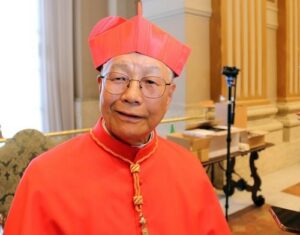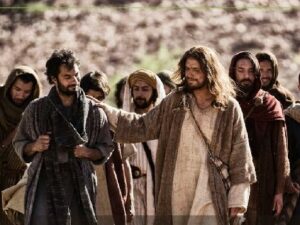L’Osservatore Romano speaks with the Prefect of the Dicastery for the Clergy before the World Day of Prayer for Vocations on April 21
Andrea MONDA
With a view to the World Day of Prayer for Vocations next Sunday, April 21, L’Osservatore Romano has posed some questions to the Cardinal Prefect of the Dicastery for the Clergy, Lázaro You Heung-sik.
What is a vocation?
 Before thinking about any religious or spiritual aspect, I would say the following: the vocation is essentially the call to be happy, to take charge of one’s life, to realize it fully and not to waste it. This is the first wish that God has for each man and woman, for each one of us: that our life does not go out, that it not be wasted, that it shines to the maximum. And, for this reason, he has become close in his Son Jesus and wants to draw us into the embrace of his love; Thus, thanks to Baptism, we become an active part of this love story and, when we feel loved and accompanied, then our existence becomes a path to happiness, to an endless life. A path that is then incarnated and realized in a life choice, in a specific mission and in multiple daily situations.
Before thinking about any religious or spiritual aspect, I would say the following: the vocation is essentially the call to be happy, to take charge of one’s life, to realize it fully and not to waste it. This is the first wish that God has for each man and woman, for each one of us: that our life does not go out, that it not be wasted, that it shines to the maximum. And, for this reason, he has become close in his Son Jesus and wants to draw us into the embrace of his love; Thus, thanks to Baptism, we become an active part of this love story and, when we feel loved and accompanied, then our existence becomes a path to happiness, to an endless life. A path that is then incarnated and realized in a life choice, in a specific mission and in multiple daily situations.
But how is a vocation recognized and what is its relationship with desires?
On this topic, the rich tradition of the Church and the wisdom of Christian spirituality have much to teach us. To be happy – and happiness is the first vocation shared by
all human beings – it is necessary not to make mistakes in life choices, at least in the fundamental ones. And the first road signs that we must follow are precisely our desires, what we feel in our hearts is good for us and, through us, for the world around us. However, every day we experience how we deceive ourselves, because our desires do not always correspond to the truth of who we are; It may happen that they are the result of a partial vision, that they arise from wounds or frustrations, that they are dictated by a selfish search for our own well-being or, sometimes, we even call desires what are actually illusions. Then discernment is necessary, which is basically the spiritual art of understanding, with the grace of God, what we should choose in our lives. Discernment is only possible on the condition that we listen to ourselves and hear the presence of God in us, overcoming the current temptation to match our feelings with the absolute truth.
That is why Pope Francis, at the beginning of the Wednesday catechesis dedicated to discernment, invited us to face the effort of digging within ourselves and, at the same time, not to forget the presence of God in our lives. Here the vocation is recognized when we put our deep desires in dialogue with the work that the grace of God performs in us; Thanks to this confrontation, the night of doubts and questions gradually clears and the Lord makes us understand which path to take.
This dialogue between the human and spiritual dimensions is increasingly at the center of the formation of priests. What is our position?
 This dialogue is necessary and perhaps sometimes we have neglected it. We must not run the risk of thinking that the spiritual aspect can develop apart from the human, thus attributing a kind of “magical power” to the grace of God. God became flesh and, therefore, the vocation to which he calls us is always incarnated in our human nature. The world, society and the Church need deeply human priests, whose spiritual trait can be summarized in the same style as Jesus: not a spirituality that separates us from others or turns us into cold masters of an abstract truth, but the ability to embody God’s closeness to humanity, his love for every creature, his compassion for anyone who is marked by the wounds of life. This requires people who, although fragile like everyone else, in their fragility have sufficient psychological maturity, inner serenity and emotional balance.
This dialogue is necessary and perhaps sometimes we have neglected it. We must not run the risk of thinking that the spiritual aspect can develop apart from the human, thus attributing a kind of “magical power” to the grace of God. God became flesh and, therefore, the vocation to which he calls us is always incarnated in our human nature. The world, society and the Church need deeply human priests, whose spiritual trait can be summarized in the same style as Jesus: not a spirituality that separates us from others or turns us into cold masters of an abstract truth, but the ability to embody God’s closeness to humanity, his love for every creature, his compassion for anyone who is marked by the wounds of life. This requires people who, although fragile like everyone else, in their fragility have sufficient psychological maturity, inner serenity and emotional balance.
There are many, however, priests who experience situations of difficulty and suffering. What do you think of them?
First of all, they move me a lot. I have dedicated almost my entire life to caring for priestly formation, to accompanying and being close to priests. Today, as Prefect of the Dicastery for the Clergy, I feel even closer to the priests, to their hopes and to their work. There is no shortage of elements of concern, because in many parts of the world there is real discomfort in the life of priests. The aspects of the crisis are many, but I believe that first of all we need an ecclesial reflection on two fronts. The first: we need to rethink our way of being Church and living the Christian mission, in the effective collaboration of all the baptized, because priests are often overloaded with work, with the same tasks – not only pastoral, but also legal and administrative. – than many years ago, when they were numerically more.
Secondly, it is necessary to review the profile of the diocesan priest because, although he is not called to religious life, he must rediscover the sacramental value of fraternity, of feeling at home in the presbytery, together with the bishop, his brother priests and the faithful, because, especially in today’s difficulties, this belonging can sustain him in pastoral service and accompany him when loneliness becomes heavy. However, a new mentality and new paths of formation are necessary, because often the priest is educated to be a solitary leader, a “man alone in command”, and this is not good. We are small and full of limitations, but we are disciples of the Master. Moved by Him we can do many things. Not individually, but together, synodally. Missionary disciples,” the Holy Father repeats, “can only be together.”
Are priests “equipped” to deal with today’s culture?
 This is one of the main challenges we face today, both in initial and ongoing training. We cannot remain locked in sacred forms and make the priest a mere administrator of religious rites; Today we are going through a time marked by numerous global crises, with certain risks related to the growth of violence, war, environmental pollution and the economic crisis, all of which then has repercussions on people’s lives in terms of insecurity, anguish and fear of the future. And there is a great need for priests and lay people capable of bringing the joy of the Gospel to everyone, as a prophecy of a new world and a compass of orientation on the path of life. You are always a disciple, even if you have been a deacon, priest or bishop for many years. And the disciple always has something to learn from the only Teacher who is Jesus.
This is one of the main challenges we face today, both in initial and ongoing training. We cannot remain locked in sacred forms and make the priest a mere administrator of religious rites; Today we are going through a time marked by numerous global crises, with certain risks related to the growth of violence, war, environmental pollution and the economic crisis, all of which then has repercussions on people’s lives in terms of insecurity, anguish and fear of the future. And there is a great need for priests and lay people capable of bringing the joy of the Gospel to everyone, as a prophecy of a new world and a compass of orientation on the path of life. You are always a disciple, even if you have been a deacon, priest or bishop for many years. And the disciple always has something to learn from the only Teacher who is Jesus.
But, in your opinion, is it still worth becoming a priest today?
Despite everything, it is still worth following the Lord on this path, letting yourself be seduced by Him, giving your life for His plan. We can look at Mary, this young maiden from Nazareth who, although disturbed by the angel’s announcement, chose to risk the fascinating adventure of the call, becoming Mother of God and Mother of humanity. With the Lord, nothing is ever lost! And I would like to say a word to all priests, especially those who are discouraged or hurt at this moment: the Lord never breaks his promise. If He has called you, you will not lack the tenderness of His love, the light of the Spirit, the joy of the heart. In many ways He will manifest himself in your life as a priest. I would like this hope to reach priests, deacons and seminarians around the world, to console and encourage them. We are not alone, the Lord is always with us! And he wants us to be happy.
Read in PDF: Cardinal YOU, It is worth being priests, we are called to be happy eng


